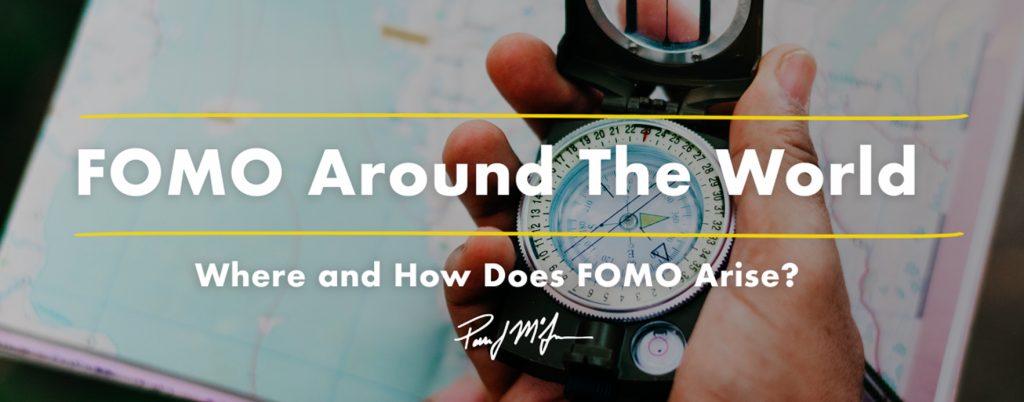Where And How Does FOMO Arise?
I’ve been to a few places so far this year - in fact, as I write this, I’m in Sierra Leone. So far in 2019, I’ve also given talks in Senegal, the Gambia, Guinea-Bissau, Cape Verde, and Mexico. Yikes! It’s a lot, but it’s fun. It’s also gotten me started on random little habit: as I go from place to place, I open my talks (which are usually focused on 10% entrepreneurship) by asking,
“Have you ever heard of FOMO?”
Typically, the room falls silent - except for people like Usman Turey from The Gambia who already knew all about FOMO Sapiens and threw out a definition as quick as lightning. But that’s an anomaly. Typically, as I start to describe the meaning of the fear of missing out, people start nodding, taking pictures of the definition slide, and murmuring, “that’s me.” By any other name, the FOMO’s the same.
You might also remember my article from January, in which I waxed contemplative about my guide in Lalibela, Ethiopia, who had never heard of FOMO - but also couldn’t comprehend my explanation of its meaning and its role in popular culture. Neither he nor anyone in the community could relate to the concept. I should have had him call Usman!
In an article last year, I talked about how FOMO is fundamental to human psychology. I still believe that the human brain is wired for FOMO: it is a natural product of our biological system of rewards and socialization. Nevertheless, I’m increasingly becoming aware that, while we’ve all undoubtedly got the potential for FOMO, some populations seem much more prone to it than others- and some manage to avoid it almost completely.

To answer this for myself, I began to compare the diverse places I’ve visited and asked people about their FOMO experiences: their cultural values, economic conditions, climate, population density, and how good their barbecue is.
When I stepped back to assess the scene, some patterns began to emerge.
- FOMO is not necessarily digital. While I absolutely maintain that social media and global digital communication are huge contributing factors in the worldwide epidemic of FOMO and FOBO, they are not the root causes, and the FOs would (and have) existed without them. Technology is an incredibly effective fuel for the FOMO fire, but even in places I’ve visited where Internet penetration and smartphone ownership are low, people can identify with and relate to FOMO as a prevalent force in their world.
- It is much less common in smaller communities. Even in populations that are more wired, populations that tend to live in smaller, more close-knit communities, especially with extended family nearby, tend to have much lower FOMO. Societies with a strong focus on “village life” and more communal use of resources, activities, and space tend to relate less to the concepts of FOMO.
- It is much more common where greater informational asymmetry exists. Asymmetric Information is a fairly simple but important concept in economics: if one side of a transaction knows more than the other side about the details of that transaction,that side has an advantage. Unfortunately, there’s plenty of commercial activity out there that’s based entirely on this concept- getting you to buy things you don’t know the value of for way more than they’re worth, or taking advantage of something you can do or produce that’s worth way more than you’re being paid for it. In places where most transactions are happening between people or parties that have similar education, knowledge, or access to information, FOMO is far less prevalent. Why? FOMO exists largely because the sufferer inflates the value of that thing or things that they don’t have, but want.
- It is an affliction of societal affluence and proximity to affluence... What I mean by that isn’t that FOMO and FOBO are about the haves vs. the have-nots. It’s about people living in affluent societies that have the opportunity to be victimized by the Paradox of Choice - the idea that too many options causes anxiety and decision paralysis (hello, FOBO!). Even people who live in relative poverty in affluent societies are confronted with a huge array of consumer choices (though they may be lower quality) every day- and are often painfully aware of the better options that may be unavailable to them.
- ...but it’s also relatively nonexistent in subsistence living. FOMO and FOBO require a fair amount of what’s called cognitive load (which basically means “room in your head to think about stuff”). That’s why they’re so nasty- in affluent societies, we’ve got the luxury of having quite a lot of free time in our minds that gets very quickly gobbled up by forces like FOMO and FOBO (the attention economy is based on this very principle). But this sort of headspace doesn’t exist when most of your activities are about meeting the needs for your, your family’s, and your community’s survival. If you don’t have the basics, you don’t have time for FOMO.
If you have FOMO or FOBO, it probably means you have it pretty good, materially speaking.
It’s important to remember that FOMO and FOBO arise when you’re in a position to compete with people over things that aren’t essential to your literal survival, or when you have so many choices to meet your needs that you find yourself overwhelmed. I bring this up because one of the best cures for FOMO is gratitude- an awareness of the good things you do have, including your possessions, your health, your friends and family, your talents and skills, your environment, and the ability to read things by brilliant guys like me whenever we want- see how humble and grateful I am?
FOMO can be a force for good if it motivates you to chase important things. When you feel FOMO, ask yourself: what is this telling me? If you can figure out the answer, do something with it!
Greetings from Sierra Leone!





